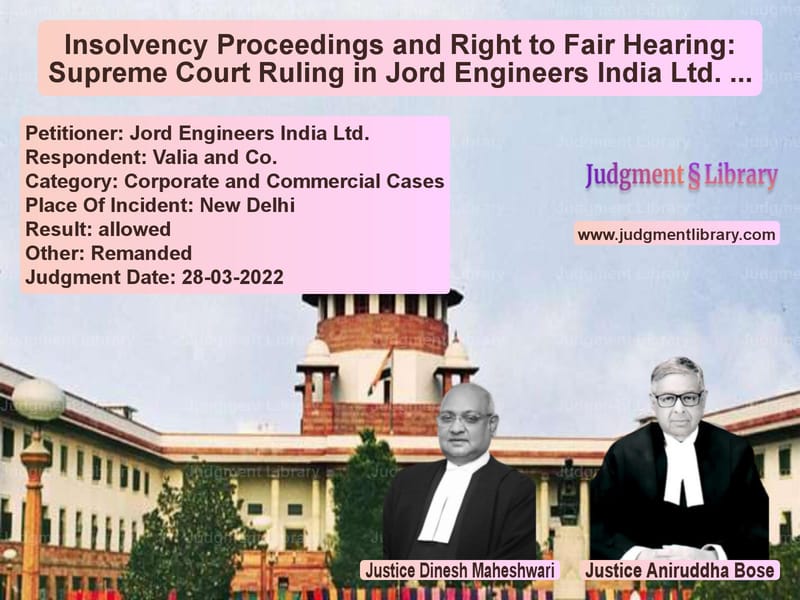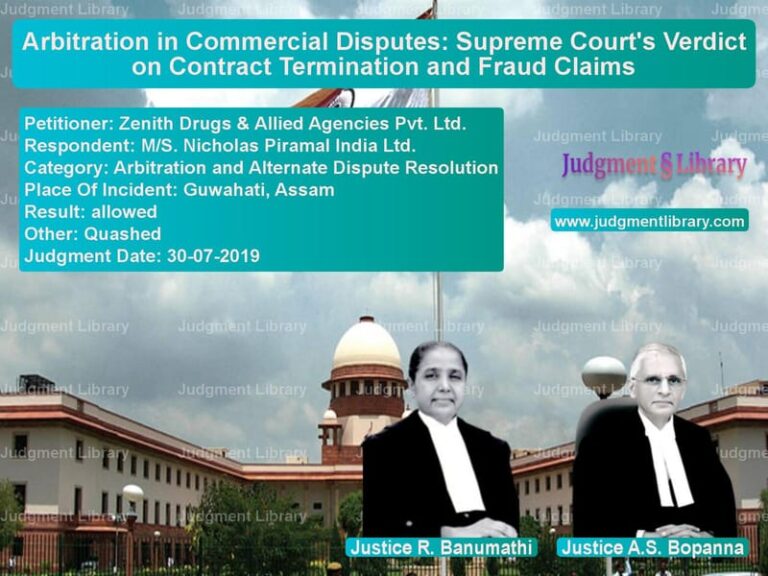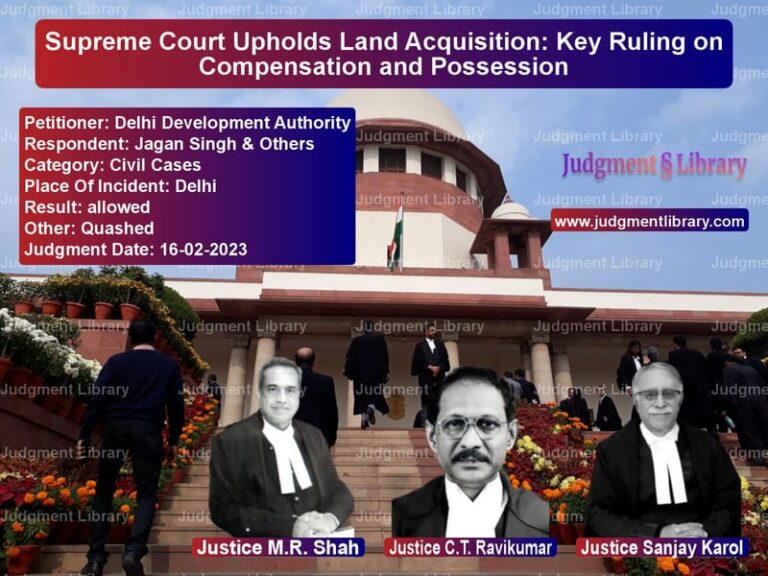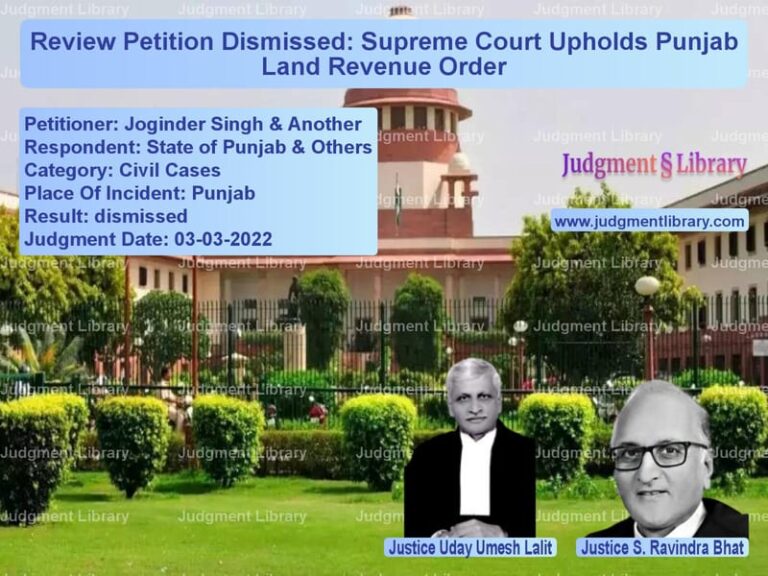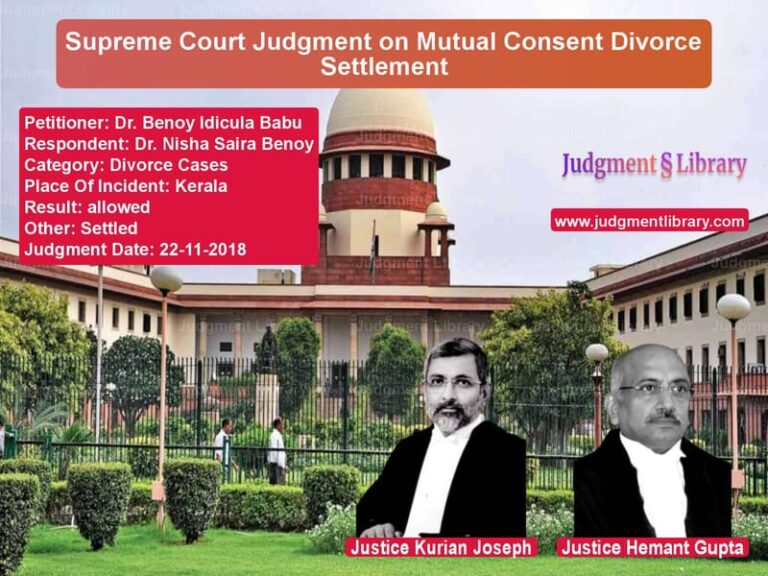Insolvency Proceedings and Right to Fair Hearing: Supreme Court Ruling in Jord Engineers India Ltd. vs. Valia and Co.
The case of Jord Engineers India Ltd. vs. Valia and Co. deals with a significant question regarding the procedural fairness in insolvency proceedings under the Insolvency and Bankruptcy Code, 2016 (IBC). The Supreme Court had to determine whether the National Company Law Appellate Tribunal (NCLAT) denied the appellant a fair hearing by proceeding with the case in its absence.
Background of the Case
The matter arose from an application under Section 9 of the IBC, filed by the respondent, Valia and Co., claiming to be an operational creditor against Jord Engineers India Ltd. The claim was based on an alleged default of Rs. 4.72 crores related to goods supplied in 2012.
The National Company Law Tribunal (NCLT), Mumbai Bench admitted the application on July 31, 2017, initiating the Corporate Insolvency Resolution Process (CIRP) against Jord Engineers. However, the NCLAT set aside this order on October 13, 2017, ruling that the demand notice served by the operational creditor was issued by an advocate and not the creditor itself, making it invalid.
Valia and Co. challenged this NCLAT order before the Supreme Court through a Special Leave Petition (SLP No. 8145 of 2018). The Supreme Court, in its order dated April 2, 2018, remanded the matter to NCLAT in light of the ruling in Macquarie Bank Limited v. Shilpi Cable Technologies Limited, where it was held that a lawyer could indeed issue a demand notice on behalf of an operational creditor.
However, when the matter was heard again before the NCLAT, Jord Engineers India Ltd. was not present due to issues related to service of notice. Despite this, the NCLAT proceeded and ruled against Jord Engineers.
Petitioner’s Arguments (Jord Engineers India Ltd.)
The appellant argued:
- They were not properly served with notice of the proceedings before NCLAT.
- The previous Supreme Court order directing the matter to be reconsidered was passed without their knowledge.
- The NCLAT proceeded to pass an order in their absence, violating the principles of natural justice.
- There existed a pre-existing dispute regarding the claim amount, which the tribunal failed to consider.
- The insolvency proceedings should be set aside, and they should be given a fair opportunity to present their case.
Respondent’s Arguments (Valia and Co.)
The operational creditor countered:
- The order passed by the Supreme Court in 2018 had allowed the appeal to be reconsidered.
- The appellant was aware of the proceedings but failed to appear.
- The demand notice was valid under the IBC as per the Supreme Court’s ruling in Macquarie Bank Limited.
- Jord Engineers had defaulted on payments, and insolvency proceedings were lawfully initiated.
Supreme Court’s Observations
The Supreme Court examined the procedural aspects and made the following key observations:
- The NCLAT did not ensure that Jord Engineers was properly served notice before proceeding with the case.
- Under the principles of natural justice, no party should be condemned unheard.
- Even though the Supreme Court had remanded the matter, the NCLAT should have ensured proper service and given Jord Engineers a reasonable opportunity to present its case.
- The issue of a pre-existing dispute was not adequately considered by the NCLAT.
The Court stated:
“The appellant was not present before the Appellate Tribunal, and it is difficult to impute knowledge in the appellant about the order passed by this Court on 02.04.2018 without notice. The revival of proceedings without ensuring service of notice to the appellant amounts to a denial of fair opportunity.”
Final Judgment
The Supreme Court ruled in favor of Jord Engineers India Ltd. and held:
- The order dated July 9, 2018, passed by the NCLAT, was set aside.
- The matter was remanded back to the NCLAT for a fresh decision after ensuring that all parties had a fair opportunity to present their arguments.
- Until a fresh decision is made, proceedings before the NCLT shall remain stayed.
- Other creditors of the company could pursue independent claims, which would be decided on their own merits.
Key Takeaways from the Judgment
- Right to a Fair Hearing is Fundamental: The Supreme Court reinforced the principle that no party should be denied a fair hearing due to procedural lapses.
- Natural Justice in Insolvency Proceedings: Even in IBC cases, procedural fairness is critical, and tribunals must ensure due process.
- Importance of Proper Notice: If a party is not properly served notice, any order passed in their absence may be set aside.
- Tribunals Must Reconsider Pre-Existing Disputes: The existence of a pre-existing dispute can impact the legitimacy of insolvency proceedings and must be examined.
Conclusion
This Supreme Court ruling highlights the importance of procedural fairness in insolvency cases. While the IBC aims to provide a swift resolution to creditor claims, the rights of corporate debtors must also be protected. The decision sets an important precedent ensuring that companies facing insolvency are given a fair chance to defend themselves before being subjected to liquidation or resolution processes.
Petitioner Name: Jord Engineers India Ltd..Respondent Name: Valia and Co..Judgment By: Justice Dinesh Maheshwari, Justice Aniruddha Bose.Place Of Incident: New Delhi.Judgment Date: 28-03-2022.
Don’t miss out on the full details! Download the complete judgment in PDF format below and gain valuable insights instantly!
Download Judgment: jord-engineers-india-vs-valia-and-co.-supreme-court-of-india-judgment-dated-28-03-2022.pdf
Directly Download Judgment: Directly download this Judgment
See all petitions in Bankruptcy and Insolvency
See all petitions in Corporate Compliance
See all petitions in Company Law
See all petitions in unfair trade practices
See all petitions in Arbitration Awards
See all petitions in Judgment by Dinesh Maheshwari
See all petitions in Judgment by Aniruddha Bose
See all petitions in allowed
See all petitions in Remanded
See all petitions in supreme court of India judgments March 2022
See all petitions in 2022 judgments
See all posts in Corporate and Commercial Cases Category
See all allowed petitions in Corporate and Commercial Cases Category
See all Dismissed petitions in Corporate and Commercial Cases Category
See all partially allowed petitions in Corporate and Commercial Cases Category

